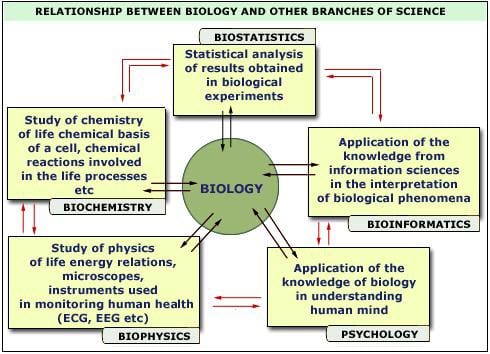Best Biology Career Options – Top 50 fields of biology
By ‘life,’ we mean a thing that can nourish itself and grow and decay – Aristotle
The branch of science that deals with the study of living creatures and their life processes are known as biology (Greek words, bios = life, logos = study). It encompasses all aspects of the study of living creatures like their occurrence, external form, internal structure, classification, ecology, organization, economic importance, nutrition, health and other body functions, life history, reproduction, inheritance, and origin. Being a multidisciplinary subject, ‘biology’ tern is often replaced by the terms – biological sciences or life sciences.
There are vast areas of sub-disciplines in Biology. Some of the areas of biology have been around for years, while others are relatively new. The new, as well as previously existing field of biology, are developing continuously & providing new opportunities. This article will provide you with in-depth information regarding the same.
As someone who is interested in Biology/ Life Sciences, you might be wondering which are the Best Biology Career Options.
Biotecnika bring you the list of Best Biology Career Options- With A Detailed list of career opportunities and growth in future
Fields
of biology, such as zoology and genetics, can be general topics and contain many specializations within each area. For example, an ethologist is an ecologist who studies animal behavior. Although when we look at a broader term, an ecologist is someone who studies the interaction of animals with its environment. Therefore you can see from the above example, one discipline in biology can have several other sub-fields.During the course of biology study, one gains a broad range of knowledge that helps him to understand the diversity of life. One get’s to the role of biology in society – including the environment, energy consumption, healthcare, agriculture & much more.
During the degree program, the skills that you gain will be as important as knowledge. If you want to get into the research field you should work on your thought process of designing experiments. You should also develop a habit of applying scientific principles to problems, and further communicate these findings in a relatable manner.
Many potential jobs exist for a biology degree. There are enormous fields which one can choose from. While choosing the Best Biology Career Options, you should be confident enough and stay positive and motivated.
Let’s Have A Look At Best Biology Career Options. Here’s A List of Top 50 Fields
| Taxonomy | Ecology | Food Safety |
| Morphology | Evolution | Physiology |
| Anatomy | Genetics | Plant Physiology |
| Histology | Immunology | Radiobiology |
| Cytology | Marine Biology | Structural Biology |
| Biochemistry | Microbiology | Theoretical Biology |
| Biophysics | Molecular Biology | Virology |
| Biotechnology | Mycology | Zoology |
| Botany | Parasitology | Genetic Counsellors |
| Cell Biology | Photobiology | Epidemiologist |
| Embryology | Cryobiology | Paleontology |
| Bioinformatics | QA / QC | Astrobiology |
| Actinobiology | Anthology | Pharmacognosy |
| Pharmacology | Agronomy | Sericulture |
| Enzymology | Horticulture | Paleozoology |
| Pisciculture | Pathology & Agroforestry | Ethology & Toxicology |
- Taxonomy: In biology, taxonomy is the science of identification, nomenclature, and classification of organisms. If you like contemporary Biology, this field is for you! And as we know, there are millions of species left to be discovered; therefore, taxonomy has immense opportunities and growth.
- Morphology: The study of the external features of an organism including the structure, color, size, shape, and relative position of various living organs of a living being. After pursuing a course in morphology, You can become a professor in top-notch colleges.
- Anatomy: Are you fascinated about the internal features of living organisms? Then this field is worth considering. Anatomy is the study of the internal structures after dissection. B. Sc. in Anatomy is a 3- year undergraduate course in science. It is a study of the organs, tissues, and structures of the bodies of humans, animals, and other organisms, and also an academic exploration of human evolution, stem cell development, genetics, and biodiversity.
- Histology: The study of tissue structure and organization as observed under a light microscope. After getting a degree in histology, you can work in scientific institutes, research labs, pathology, etc. with lucrative salary and incentives.
- Cytology: Study of the different forms and structures of cells, including the behavior of the nucleus. You can work as a cell biologist in industries as well as research labs. Cell biologists are in demand as their skills are required in drug discovery, immunology, cell signaling, and various other research projects.
- Biochemistry: Biochemistry is concerned with the chemical & physicochemical processes that occur within living organisms. It includes the study of Bio-organic Chemistry, Biophysical Chemistry, Human Physiology, Microbiology and Virology, Basic Immunology, Enzymology, etc. B.Sc. (Biochemistry) degree course also includes the study of the structure and function of cellular components
- Biophysics: The science of the application of the laws of physics to a biological phenomenon. Top Indian Universities such as AIIMS Delhi, Manipal University and University of Mumbai offers three years undergraduate program in Biophysics
- Biotechnology: This branch involves the exploitation of biological processes such as genetic manipulation of microbes for the production of hormones, antibiotics, etc. B.Sc. Biotechnology is a 3-year undergraduate course. The minimum educational qualification required to apply for the course is 10+2 in biological science stream completed from a recognized educational board. As a biotechnologist, you will have immense opportunities in academia as well as industry.
- Botany: If you love plants, this is the subject for you. The scientific study of plants, including their structure, physiology, ecology, and genetics. B.Sc. Botany is an undergraduate degree course for a 3-year duration. The course deals with the study of plants and their physiology, anatomy, reproduction, etc. Further, you can go on to pursue a master’s in this discipline and subsequently earn a Ph.D. This will help you build a firm career in the field of botany. A botanist is even being hired in industries dealing with medicinal plants etc.
- Cell Biology: It is the study of cell structure and function, and revolves around the concept that cell is the elementary unit of life. Cell Biology features in Best Biology Career Options due to the diversity and broad career prospectus it provides.
- Ecology: It is the branch of biology that studies the relations of organisms with one another and also to their physical environs. B.Sc. Environmental Science & Ecology degree holders have different career options in numerous specializations of Environmental Science, for example, Environmental Chemistry, Water & Watershed, Toxicology and Risk Assessment, etc.
- Evolution: Evolution defines the course through which different kinds of living organisms have developed and diversified from earlier forms during the history of the earth. Are you curious about the evolution of earth and mankind? Do you agree with the hypothesis of evolutionary biologists regarding evolution? If yes, then this sub-discipline of biology will be highly rewarding for you.
- Genetics: It is the study of genetic variations and heredity in living organisms. Subjects usually studied in the B.Sc Genetics curriculum are Microbial Genetics & Technology, Cell Biology, Population Genetics, Biostatistics, Genome Organization, Biochemistry, etc. You can earn your master’s degree post bachelor’s. Top research institutes in India provide a Master’s degree solely dedicated to genetics.
- Immunology: It is the branch dealing with medicine and biology involving immunity. This sub-discipline of biology has applications in various disciplines of medicine such as virology, dermatology, organ transplantation, oncology, parasitology, and bacteriology. Immunology has vast scope for aspirants. You can also work as a visiting immunologist in various hospitals. The students who are doing training in doctorate can avail of the placements with high salaries in private hospitals depending upon their experience.
- Marine Biology: The scientific study of organisms present in the ocean and other marine water bodies. A person who specializes in the field of Marine Biology and pursues Marine Biology Courses is commonly known as a Marine Biologist. They are trained professionals to examine various sea creatures. Since a large proportion of earth is full of oceans & water bodies, the demand for Marine Biologists is on the rise.
- Microbiology: Microorganisms, along with their activities, are fundamentally important to almost all processes on earth. A microbiologist is someone who works in the domain of microbiology. He is a scientist who makes a thorough study of the microorganisms. Microbiologists examine the characteristics of microscopic organisms such as bacteria, viruses, and fungi. By pursuing microbiology, you can work in academia as well as industry.
- Molecular Biology: The branch of biology dealing with the structure and function of nucleic acids and proteins. A program in Molecular Biology are offered mainly at the master’s level. After pursuing a Bachelor’s Degree in any life science discipline, you can opt for a Molecular biology course. Molecular Biologists find employment opportunities in research labs established by the Government or in the R&D departments of various private drug companies. You can work in industries pertaining to drug development, genetics, stem cells, etc.
- Mycology: It is the scientific study of fungi, involving its characteristics, classification, and life cycle. Mycology can be considered as a niche field of microbiology. Mycologists study the properties of fungi. They also study the ways these eukaryotic organisms can be used to benefit society and also the potential risks it may pose. A bachelor’s degree in microbiology can help you enter this niche field. You can find job opportunities in the agricultural sector and food industries as a Mycologist.
- Parasitology: It is a branch of biology dealing with the study of parasitic organisms. A Parasitologist scientifically studies parasites and their relation to their host environment. Parasites may have a positive as well as the negative impact on its prey. The role of a parasitologist is to study both the aspects and put them to practical use.
- Photobiology: Photobiology is defined as all biological phenomena involving non-ionizing radiation. Scientists have found that photobiological responses are the result of chemical and/or physical changes induced in biological systems by non-ionizing radiation. This is one of the emerging fields of biology with immense scope. One can start a career in photobiology by pursuing a degree in Biophysics and move up the ladder.
- Food Safety Analyst: Food biology is gained importance in the past 2 decades with increasing concern about food safety. You will have the opportunity to work in top government institutions after earning a degree in Food technology. It’s mandatory worldwide for all Food Manufacturing companies to have a Food Analyst in order to cross-check & maintain the quality of Food materials & beverages. Each country has a government body in order to regulate the quality of the food supplied to the mass, like the FSSAI in India & FSIS in the United States. As per FSSAI, a candidate should hold a Master’s degree in Chemistry or Biochemistry or Microbiology or Dairy Chemistry or Food Technology, Food and Nutrition, or hold Bachelor of Technology in Dairy/Oil or hold a degree in Veterinary Sciences in order to be eligible for a Food Analyst post.
- Physiology: The study of physiology prepares you for a wide range of careers. It is the study of organ functioning in living organisms. Physiology graduates can also use the general skills and knowledge they have acquired to pursue a career in a variety of workplaces including the medical and research sectors.
- Plant Physiology: It is a sub-discipline of botany dealing with the functioning or physiological reactions specifically in plants. After pursuing a bachelor’s degree in physiology, you can undertake a specialization in plant physiology if you have an inclination towards botany. Plant physiologists can find job opportunities in the agricultural sector, research laboratories, etc.
- Radiobiology: It is an emerging branch of biology involving the study of the action of ionizing radiation and it’s effects on living beings. Radiation biologists study the effects of various types of radiation on living things. Careers in radiation biology are chiefly available in healthcare, private industries, or government facilities. A career in radiation biology can include work as a medical physicist, radiation biologist, nuclear medicine technologist, and radiation therapist. All of these professionals work within the medical field, using radio technology to treat patients.
- Structural Biology: It is an amalgamation of biochemistry, molecular biology, & biophysics that is concerned with the molecular structure of biological molecules. Post-master’s in the field of biochemistry or molecular biology; one can proceed in this field by taking up research projects. Bioinformatics and computational biology techniques are key in Structural Biology.
- Theoretical Biology: Do you love math and biology? If you’re struggling to decide which to major in, you may not have to choose. Careers in theoretical biology give students the opportunity to use their knowledge of numbers in a lot of important ways, such as analyzing biological theories and systems. There are a lot of education options for this career. Students can major in mathematical biology or computational biology. Most jobs in this field require an advanced degree. Bachelor programs offer courses in biological cell models, biophysics, and computational mathematics. Master degrees offer courses in statistical theories and stochastic processes.
- Virology: The branch of science concerning the study of viruses. In India, virology is available after the bachelor’s degree program, i.e., at the master’s level. With an increase in virus-related diseases in India, the career is of virologist is very challenging as well as rewarding. The National Institute of Virology, Pune is a premier institute in India imparting a Master’s course in Virology.
- Zoology: It is the scientific study of the classification, structure, behavior, physiology, and distribution of animals. With the increasing disbalance between living beings and mother nature, a Zoologist is one who can keep a check on the wildlife aspect of it. If you love wildlife and everything in it, then this could be the job for you. Being a zoologist means that you will be studying how different animals in the wilds connect with everyone else in the ecosystem. Most zoologists work in local, federal, or state government. Depending on your work assignment, you may mostly work in the field to gather data or remain in the laboratory to conduct experiments on data that have already been gathered by your colleagues.
- Genetic Counsellors: Genetic counselors are professionals who are in-charged of assessing different gene strands or DNAs to know the level of risk an individual has in contracting a particular disease or disorder. When you work as a genetic counselor, you can expect to be more exposed to a hospital setting, laboratories, or clinics. Each genetic counselor is trained to analyze genetic data through different mediums and translate them into detailed information for families to understand.
- Epidemiologist: Epidemiologists are public health professionals who are in-charged of studying various patterns of human diseases and injuries. At its core, it requires professionals to do detective jobs in determining the sources of diseases, especially during outbreaks, and find a solution to stop them from spreading out. Previously, epidemiologists are more exposed to the fieldwork, but now most people just work in their laboratories and conduct experiments.
- Embryology: It is the study of fertilization, growth, division, & differentiation of the zygote into an embryo. Embryologists work with people who possess reproductive problems like Polycystic Ovarian Syndrome or difficulty in conceiving and are looking into in vitro fertilization (IVF) and other reproductive alternatives. The main purpose of an embryologist is to work upon undeveloped egg cells (oocytes) to examine their health and check if they can overcome fertility issues. Post bachelor’s, you can proceed with M.Sc in Clinical Embryology. You can get placed in leading IVF hospitals and centers
- Cryobiology: The study of the effects of very low temperatures on life. This is an emerging area in biology with wide applications.
- Paleontology: It is the study of remains or fossils and impressions of the past organisms available in the rocks belonging to different ages. Paleontologists are scientists who study fossils, the remains of ancient organisms in order to investigate past life on earth or prehistoric life. They conduct research on prehistoric life forms and the evolution of plant and animal life through the examination of fossils. Paleontologists should possess high-level computer skills as well as be competent in statistical analysis. One must possess good interpersonal skills as well as oral and written communication skills. This is due to the fact that they will be most often required to work with a team of professionals.
- Astrobiology: It includes scientific inquest that deals with the possibility of life in outer space. This interdisciplinary field requires a comprehensive, integrated understanding of biological, planetary, as well as cosmic phenomena. Astrobiology encompasses the search for habitable planets in our Solar system and the galaxy; Currently, there are very few degree programs available in astrobiology. It is an excellent field of biology. Do you aspire to work at NASA? They are always on a lookout for astrobiologists. There is no well-defined career pathway to become an astrobiologist. You should be able to make connections and approach labs that are pursuing research in this field.
- Bioinformatics: Bioinformatics or computational biology is the use of information technology in the field of molecular biology or applying computer technology to biological research and management. Hereby computers are used to gather, store, analyze, and merge biological information. It is an emerging interdisciplinary research field and is progressively getting used to boost the standard of life. Bioinformatics Career Scope & Job prospects have become widespread after the merging of the information technology sector has taken place with that of molecular biology. Job prospects are in all sectors of biotechnology, pharmaceutical, and biomedical sciences, in research institutions, hospitals, and industry. Top Indian Universities provide bioinformatics in Bachelor’s as well as masters level.
- Quality Control & Quality Analyst: Quality Control & Quality Assurance (QC, QA) involves management & procedures to preserve and enhance the quality of products or services. It comprises of a multilayer system of protocols, checks, audits, and corrective measures used to ensure top quality data is picked up from fieldwork and laboratory analysis during any drug investigation or other related Scientific Procedures.
So far, we have looked into the broad fields of Biology which are the best career options for students planning to pursue a career in the Biology/ Life Science field. Below are a few more specialized fields of biology with a rewarding career. Though these fields have lesser job opportunities but its ideal for passionate students who want to work in a diverse & different arena of biology.
- Actinobiology: It is a relatively new branch of biology dealing with the effects of the radiation on organisms. Sounds interesting, right? Actinobiology has become relevant in space travel due to cosmic radiation. NASA is on a continuous lookout for candidates with expertise in actinobiology.
- Anthology: It is the branch dealing with the study of flowers. Anthropologists can seek employment in the cosmetic & Ayurvedic Industry.
- Pharmacognosy: The branch of science concerned with medicinal plants and leveraging its effect for the benefit of humans. This field is a highly emerging filed with loads of research happening all across the world. Leading Pharma Giants like Novartis, Novo Nordisk frequently hires for this post.
- Pharmacology: It is the study of the synthesis of medicines and their effects on organisms. In combination with specialization in Pharmacognosy – this filed can fetch you jobs at leading biopharma companies all across the world on a condition that you have some amount of experience in this field.
- Agroforestry: The branch is concerned with the form of land being used on which of herbaceous crops and cultivation of trees crops. Govt Ministry of environment-related Institutes & Organizations is on a constant lookout for people with this specialization.
- Agronomy: It is the science dealing with the crop plants.
- Sericulture: Study of the silk industry in relation to the culture of silk moth and pupa. Central silk board is a leading govt organization in India, where one can seek job opportunities in this sector. The apparel industry also have vacancies for sericulture degree candidates.
- Enzymology: The branch concerned with the study of enzymes. Though it sounds an uncommon filed, its a part of Biochemistry and thus has loads of research job opportunities.
- Ethology: Ethology is a sub-discipline of zoology dealing with animal behavior. Ethologists analyze and attempt to understand the reasons behind animal behavior. This is more than just a zoo research position: some ethologists work for governments, large companies, and other industries. A graduate degree is generally required to work in this field.
- Paleozoology: It is the study of fossils and their distribution worldwide.
- Horticulture: It is the study of flowering as well as fruit plants. A horticulturist is a person who uses his skills and knowledge in the production of plants. The main aim of horticulturists is to improve plant growth, quality, nutritional value, yield, and resistance to insects, diseases, and environmental stresses.
- Pisciculture: The study concerned with the rearing of fish. The fish industry is huge in India & abroad thus opening career opportunities for those who have a specialization in this field.
- Pathology: It is the study of various diseases found in human beings. With this specialization, you can easily get a job in the diagnostics industry.
- Toxicology: It is the study of chemicals and it’s harmful effects on humans and other living organisms. Toxicologists & Biochemists work hand -hand in a lot of research projects.
There you go, above was a list of Best Biology Career Options – Top 50 List. These are the top 50 biology fields where you can make a successful career.
For pursuing a BSc Biology degree, the basic eligibility criterion is to qualify 10+2 or equivalent examination in Science stream, securing a minimum 50% marks in Biology subject and/or in aggregate from a recognized board. A few institutes may conduct entrance tests as well. BSc Biology in any of the above-mentioned disciplines is a three-year bachelor’s degree course.
Upon completion of a B.Sc in a biological science stream, you can opt for master’s to get better employment opportunities. You can appear for top entrance exams conducted in India as a gateway to premier colleges in India.
These exams may include IIT-JAM, JNU CEEB, JGEEBILS, etc.
Best Biology Career Options & Potential Employment Areas:
Some of the employment areas where you can utilize your talent with a higher degree in Biology are as follows:
- Agricultural Research Services
- Biotechnology Firms
- Botanical Gardens
- Botanical Survey
- Broadcast Companies
- Clinical Research Organizations
- Colleges/Universities
- Conservatories
- Environmental Management and Conservation
- Farm Management Organizations
- Fermentation Industries (including Breweries)
- Fertilizer & Chemicals Plants
- Food Institutes
- Plant Genetics
- Herbal Products Companies
- Hospitals
- Plant Genetics Research Centres
- Research and Development Firms
- Scientific and Medical Equipment Suppliers
- Medical Research
- Medical Laboratories
- National Parks
- Pharmaceutical Companies
- Seed And Nursery Companies
- Wildlife and Fishery Departments
A Doctorate or Master’s degree holder in any discipline of Biology their Career Options increases and you can find more opportunities. It offers ample job opportunities which include the following:
- Biology Content Developer
- Biology Researcher
- Biological Technician
- Botanist
- Conservationist
- Ecologist
- Environment Consultant
- Farming Consultant
- Forester
- Geneticist
- Horticulturist
- Laboratory Technician
- Molecular Biologist
- Museum Educator
- Mycologist
- Natural Resources Manager
- Nursery Manager
- Plant Biochemist
- Plant Explorer
- Plant Researcher
- Science Advisor
Thus, it is evident that the subject of Biology has the potential to offer an extensive range of employment opportunities in both governments as well as private sectors. A lot of development has been done over the years in the subject of Biology, and thus there is a great room for the aspirants in the time to come – Best Biology Career Options.
Further, getting work experience in the area of biology, one is interested in is an important aspect to develop a career in this field.
In a job market that is highly competitive, relevant experience can show one’s commitment to the career and also develops one’s practical skills. This practice will also give you the opportunity to make professional contacts.
Also, if you are unsure about the area of biology which interests you, work experience can impart a beneficial insight into what the work is like. Taking up internship projects in a research lab, attending a national and international conference, and gaining practical exposure apart from good academics is the key to build a successful career in biology.
All the Best!
Editor’s Note: Best Biology Career Options, Best Biology research fields, Top Life Science Filed to Pursue A Career








































Such a helpful Article.